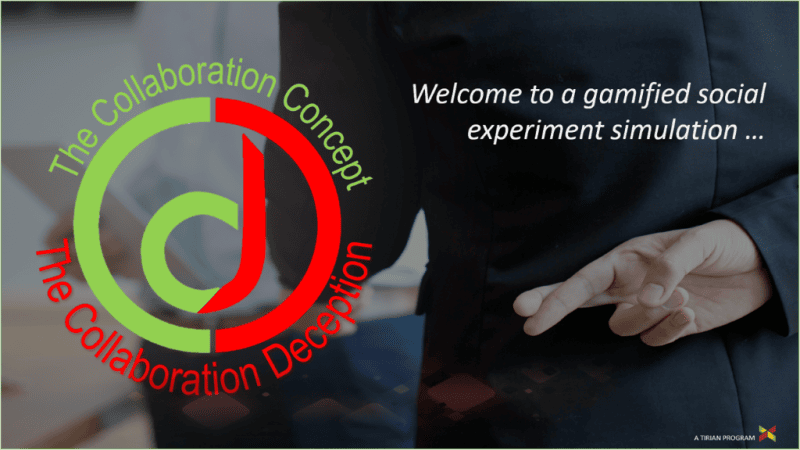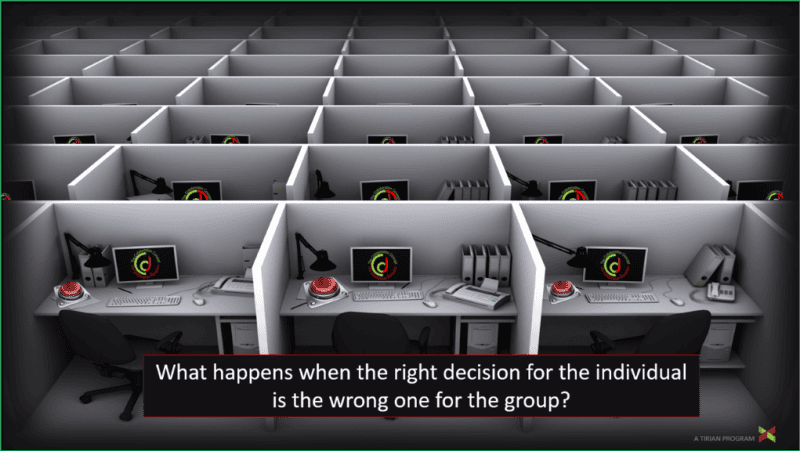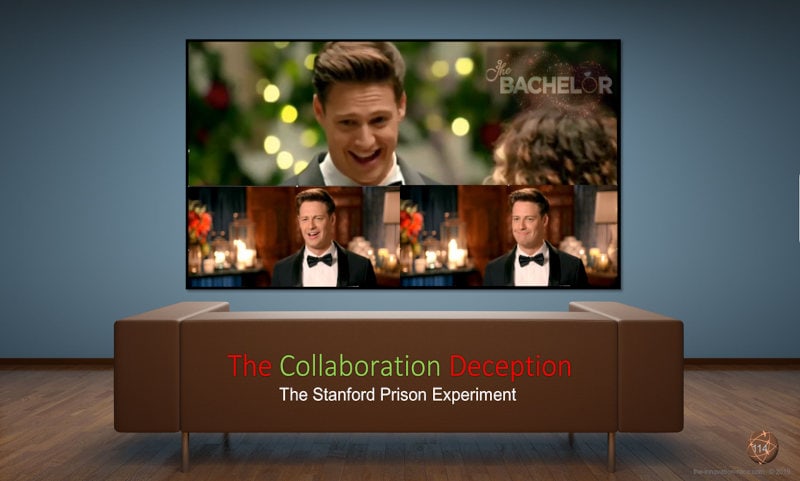The Collaboration Concept
Featuring “The Collaboration Deception” gamified simulation

ABOUT: How to build a collaborative culture in a competitive environment.
Collaboration is a term often used by leaders and found in mission statements, yet implementation can be a deceptive challenge.
This session delves deep into the concept of collaboration, exploring the critical question: “Under what conditions will people really cooperate?” This seemingly simple question holds significant implications for anyone seeking to foster a collaborative environment, from corporate managers to governments & even countries in conflict. Through honest and detailed investigation of this topic, the program strives to comprehend how to effectively incentivize cooperation (especially in the context of a competitive corporate business environment).

OUTCOMES: Expected mindset and behaviour changes
- Understand the forces at work with the dilemma of collaborating in a competitive environment
- Determine what non-collaborative behaviours (e.g., defecting/freeriding) occur in business contexts and what impact they have
- Identify how to change behaviour related to “we versus they” thinking
- Address the concerns and interests of others with opposing viewpoints
- Outline actions needed to reduce non-collaborative behaviours in the workplace
- Explore collaborative behaviours and expectations in their workplace

THE DECEPTIVE DISGUISES OF COLLABORATION
Reality TV is not about collaboration or team building. “The Bachelor” isn’t about authentic relationships, “Survivor” isn’t team endurance on a deserted beach, and ”The Amazing Race” leaves little time to appreciate other cultures. These ruthless types of shows are this generation’s ‘Stanford Prison Experiment’.
The fake reality of ‘Team Building’ disguised in the concept of a ‘competitive race’ and often trumpeted through the genre of contemporary Reality TV needs to be challenged. Corporate teams also need unpack ‘team building’ and look at the alternatives and see real concepts of collaboration. Only then can collaboration become a constructive, meaningful, and actionable outcome that enables sustainable innovation.

Module 1: THE COOPERATION CONUNDRUM- The Many Faces of Collaboration.
Identifying collaboration: How many people do we trust in a day? And why it’s important. The ways the concept of collaboration can be misinterpreted, misunderstood and misused. Conflicts of interest: Does trust really make the world go around? Comparing individual and team needs.
Key Question: ‘What happens when the right decision for the individual is the wrong one for the group?
1
Identifying collaboration
The ways collaboration can be misinterpreted, misunderstood and misused.
2
Does that which suits the individual agenda also suit the team agenda?
3
To the core of collaboration
4
Finding win-wins
Under what conditions will people really collaborate? (behavioral economics).

Module 2: THE COLLABORATION DECEPTION – A potent game-theory style experience
Participants engage in several social experiments to explore the behavioral economics of individuals, teams and whole business units. In a safe, reversible environment, they will experience firsthand the consequences when trust and accountability are removed from the equation and quickly discover the power of real collaboration to achieve outstanding results. Key Question: ‘How is it possible to collaborate in a competitively incentivized environment? ‘
1
From Individuals to Teams
THE GAME OF GAINS
(Team Simulation)
2
From Teams to whole Organisations
BREAKING SILOS
(Team Activity)

Module 3: IMPLICATIONS AND APPLICATIONS consists of the following modules
The session concludes with insights on how to ensure collaboration is advantageous for both the individual and the group, preventing it from being merely an empty word or a deception. Key Question: Under what conditions can a collaborative strategy survive, and how is it possible to create a culture to support collaboration?
- Implications. How to create a culture of collaboration. The 7 strategies to become more collaborative along with leadership pitfalls – non-collaborative solutions.
- Workplace applications. Designing a collaborative culture to ensure that the common interest can exceed individual differences & costs to benefits at work favour collaboration? Successful innovative companies collaborate. How to win at an impossible game (collaboration in a competitive environment)
- Action planning. What can be done to ensure real collaboration and change behaviors, and how is it possible to measure change?
1
How to create a culture of Collaborative Innovation.
2
The tragedy of commons
Dealing with free riders & defectors in the workplace.
3
Designing a culture of collaboration
Ensuring that the common interest can exceed individual differences.

Extended workshop and facilitated team planning
- The advanced extension deep dive workshop is based on Dr Gaia Grant’s PhD research and books ‘Purpose-Driven Innovation’ and ‘The Innovation Race’.
- It explores the important questions around ‘Cooperation Theory’, exploring the paradoxes between Individualism and Collaboration.
- This session can also include the Innovative Climate Leadership Indicator (iCLi) assessment tool for leaders to measure and map their own and their team’s current innovation readiness and collaboration bias.
REC TIME: 1-4 hours
REC SIZE: 16-200
PLATFORMS: Keynote, Workshop, Team-Building, Gamified Simulation, Business Facilitation (integrated)
“This session explores the conditions under which people collaborate. It’s practical and effective… the engagement in the room was amazing both to have fun, but as the game progresses, you can see how it dawns on the participants that there is a deeper context related to what happens at work. This will help our KPIs and performance goals as an incredible reminder to see how to be more effective we can be if we take a more collective view.”
John Ruthven – CEO – INTEGRATED RESEARCH


